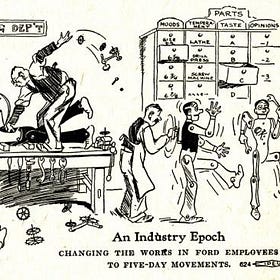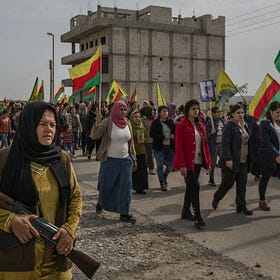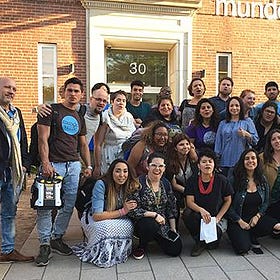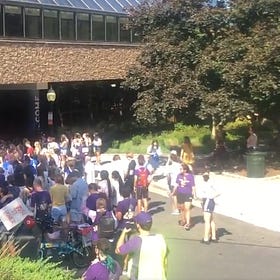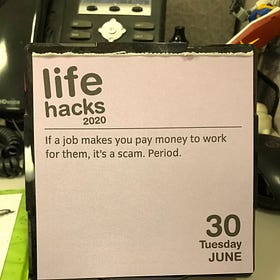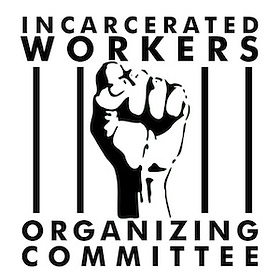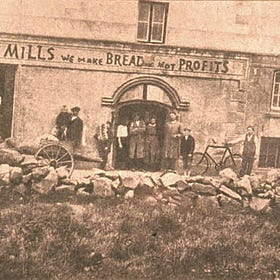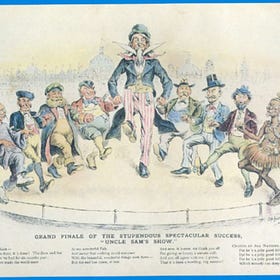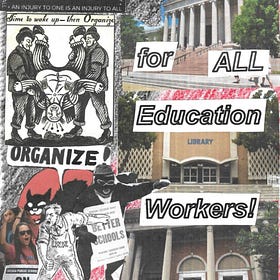A Roundup of our Key Texts
We've gathered some of our most well-received writings in one place for our new subscribers.
Welcome to our new subscribers! We’re a small, diffusely organized collective of workers in educational institutions such as schools, libraries, museums, daycares, and archives. Politically, most of us are libertarian socialist—a category that includes anti-authoritarian currents like anarchism, autonomism, council communism, and democratic confederalism. Basically, we want ordinary workers to govern social production and reproduction democratically, without bosses, capitalists, or bureaucrats. However, we consider ourselves non-sectarian and seek collaboration with all working people who want positive social change.
Nearly all of us are involved in workplace organizing in some way, often in tandem with revolutionary union formations like the Industrial Workers of the World (IWW). Right now, we’ve turned our focus to creating a series of workers’ inquiries on the education industry in the Washington, D.C. region, where some of us live, work, and organize. Our friends at Notes from Below have the best definition of workers’ inquiry that we’ve seen:
Workers’ inquiry is an approach that combines knowledge production with organising. It attempts to create useful knowledge about work, exploitation, class relations, and capitalism from the perspective of workers themselves. There are two forms of workers’ inquiry. The first is inquiry ‘from above’, involving the use of traditional research methods to gain access to the workplace. The second is inquiry ‘from below’, a method that involves ‘co-research’, in which workers themselves are involved in leading the production of knowledge. If the conditions exist, the inquiry ‘from below’ is clearly favourable. The knowledge that is produced from either of these forms of inquiry is useful for understanding capitalism, but also for organising against it.
You can expect inquiries on workplaces like the Smithsonian, DC Public Libraries, the DC charter school sector, preschools, archives, and more. But these inquiries tend to take a siginificant amount of time and energy to produce, and all of us are full time workers in a highly exploitative industry, so please be patient with us!
In the meantime, check out some of our key texts. These are essays that lay out many of our key frameworks for understanding education under capitalism, as well as our strategies for organizing for an emancipated education system under workers’ control. We also strongly recommend checking out the works of the AngryWorkers Collective, which directly inspired the formation of our own collective.
Finally, if you want to engage with us on other platforms, check out our linktree.
An Education Workers' Self-Inquiry
A scaffolded manual for building worker power in educational facilities, along with some research resources to help expedite the process.
Against Professionalism!
Professional hierarchies in educational workplaces exist to set groups of workers against each other in service of arbitrary definitions of professional conduct that are imposed by our employers.
The Working Class is (Still) in Danger! A Revolutionary Program for Times of Coups and Civil Wars
The need for a militant working class strategy in catastrophic times like these has never been more clear. We hope this text can be useful to our readers, especially those who work in education.
Towards a Revolutionary Union Movement, Part One: Introduction
We need a new, revolutionary type of unionism that can confront the power of the employing class. Our new essay series examines which traits revolutionary unions must possess to succeed.
Proletarians or Professionals? A History from Below of Teacher Unionism in the United States, 1897-2021
An analysis of the history of American teachers' unions and a meditation on the class position of teachers.
The Industrialization of Education, Part One: The Class Divide
This ongoing series examines the history of education through the lens of capitalist social relations and industrialization.
A Quick Guide to Unionization for Charter School Workers
Public School teachers are not the only ones who need unions.
The Performing Arts Proletariat vs. The Band Directors
A brilliant inquiry into the history of music education, particularly the origin of the band director in the authoritarian social relationships of capitalism.
Towards a Revolutionary Union Movement, Addendum: A Revolutionary Vehicle? The Role of the IWW
After extensive discussion among rank-and-file IWW militants with concrete workplace organizing experience, we present this evaluation of the IWW and a vision for its future.
Organizing for Ownership: Worker Co-Ops and Revolutionary Unionism
Utilizing worker-owned enterprises to revolutionary means.
Ordering the Arena of Modern Life: The Role of World's Fairs in the Education Industry
This essay makes the case for the IWW and other revolutionary unions to strategically target world's fairs and other expositions for organizing.
A Union for ALL Education Workers!
This is a pamphlet collectively written by several members of the DMV Education Workers Organizing Committee (EWOC) to lay out our principles and strategy. It is meant for printing and distributing to the community at any events we table at or host. Feel free to adapt this pamphlet for your own use.
Who are the Angry Education Workers?
This is a project to gather a community of revolutionary education workers who want a socialist education system. We want to become a platform for educators of all backgrounds and job roles to share workers’ inquiries, stories of collective action, labor strategy, theoretical reflection, radical pedagogy, and art.
Support Our Work
All our public work is freely available with no paywalls, and always will be. But if you want to help our collective cover the costs of hosting webpages, creating agitprop, and finding research materials, then please consider signing up for a paid subscription or donate to us on Ko-fi if you don’t want to give money to substack. With enough support, we can begin sharing the funds among collective members for them to use on various projects and pay others for any work they do for us—such as translating or printing materials.




